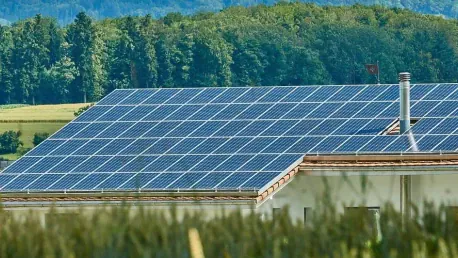In a significant leap towards sustainability, West Northamptonshire Council (WNC) has unveiled an ambitious plan to generate renewable energy through a comprehensive solar panels scheme. The Council’s new initiative aims not just to meet local climate targets but also to dramatically reduce carbon emissions and slash energy costs. Emphasizing smaller, more dispersed solar projects rather than a single, large-scale solar farm, this strategy underscores WNC’s commitment to innovative and localized solutions.
Focus on Smaller Solar Projects
WNC’s Approach to Diverse Solar Installations
Instead of opting for a large-scale single-site solar farm, West Northamptonshire Council plans to implement multiple smaller solar projects across diverse locations. These sites include various buildings and land areas, ensuring a more localized, less intrusive approach to renewable energy. By choosing this path, the Council aims to mitigate the community concerns often associated with the installation of large commercial solar farms. Smaller, well-landscaped projects are presumed to be more acceptable to the public, minimizing disruptions while maximizing benefits.
Cllr Rebecca Breese, a key proponent of the initiative, emphasized that the solar scheme is central to WNC’s goal of achieving net-zero carbon emissions by 2030. The Council believes that decentralized solar installations will better integrate with existing community structures and landscapes. This approach is anticipated to reduce visual impact and encourage greater public acceptance. Furthermore, by distributing the installations, the Council can utilize a variety of site-specific advantages, making the entire system more resilient and efficient.
Public Involvement and Planning Permissions
Public consultation and careful planning are cornerstones of the initiative. West Northamptonshire Council recognizes the importance of community involvement in the project’s success. As part of this commitment, the Council plans to engage with the public to gather feedback and address any concerns related to the solar installations. This consultative approach aims to build trust and ensure that the projects meet the community’s expectations and standards.
Planning permissions will also play a crucial role in the project’s development. The Council understands that each proposed site will need to undergo rigorous assessment processes to ensure compliance with local regulations and environmental standards. Initial assessments have already identified several potential sites for the installations. To further evaluate these sites, WNC has proposed to allocate £1.272 million in capital funding. The Cabinet is set to review these proposals at their upcoming meeting on September 17, marking a significant step towards the project’s realization.
Financial and Environmental Benefits
Economic Efficiency and Cost Savings
One of the primary motivations behind WNC’s solar panel initiative is the potential for substantial cost savings. Cllr Breese has projected that the scheme could save the Council up to £1 million annually on energy costs. This significant reduction in expenses would allow WNC to allocate more resources toward other vital community services and infrastructure projects. These financial benefits underscore the practical advantages of investing in renewable energy solutions at the local government level.
The Council is exploring various investment models to ensure the project’s economic feasibility. Options range from self-funding to forming partnerships with private sector entities. This diverse investment strategy aims to safeguard taxpayer interests while maximizing the initiative’s financial returns. By adopting a flexible approach, WNC hopes to find the most cost-effective way to implement the solar panels scheme without compromising on quality or efficiency.
Commitment to Sustainability and Climate Goals
West Northamptonshire Council’s solar panels initiative is more than just an economic strategy; it is a bold step towards achieving long-term sustainability. The initiative signifies the Council’s dedication to meeting local climate targets and reducing carbon emissions. By transitioning to renewable energy sources, WNC aims to make a substantial impact on the environment, contributing to the global effort to combat climate change.
This solar energy project is a reflection of a broader trend among local governments to adopt renewable energy solutions. Many municipalities are recognizing the dual benefits of environmental stewardship and economic efficiency. WNC’s proactive stance highlights a responsible governance model that prioritizes both the planet and the community’s well-being. The detailed approach to site assessment, public consultation, and strategic investment exemplifies a forward-thinking strategy aimed at securing a cleaner, greener future for West Northamptonshire.
Future Steps and Community Engagement
Ongoing Assessments and Planning
As the solar panels scheme progresses, West Northamptonshire Council is committed to continuous assessment and planning. The proposed allocation of £1.272 million in capital funding indicates the Council’s dedication to thoroughly evaluating the selected sites. This financial commitment ensures that each site’s viability is thoroughly assessed, considering factors such as sunlight exposure, structural suitability, and potential environmental impact.
Further scrutiny and community engagement will be vital components of the next phases. The Council plans to keep the public informed and involved throughout the process, ensuring transparency and fostering a sense of ownership within the community. Public feedback will be instrumental in shaping the final implementation plans, making adjustments as necessary to address any emerging concerns or suggestions.
Building a Sustainable Future Together
West Northamptonshire Council (WNC) has made a significant stride toward sustainability by announcing a bold plan to harness renewable energy through an extensive solar panels initiative. This new program aims to achieve local climate objectives, significantly cut carbon emissions, and reduce energy expenses. Instead of opting for one massive solar farm, the Council is focusing on smaller, more localized solar projects scattered across the area. This approach highlights WNC’s dedication to inventive and community-focused solutions, ensuring that the benefits of renewable energy are widely distributed. The initiative is set to transform the region’s energy landscape, making it more resilient and sustainable. By investing in these smaller-scale solar endeavors, WNC not only maximizes its renewable energy output but also engages local communities in the transition to greener energy sources. This emphasis on localized projects fosters a sense of communal responsibility and participation in climate action, positioning West Northamptonshire as a leader in embracing and implementing sustainable practices.









